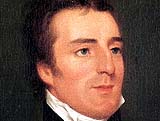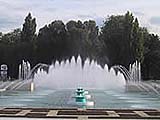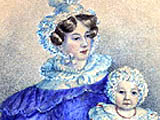| ||||||||||||||||||||||||||||||||||||||||||||||||||||||||||||||||||||||||||||||||||||||||||||||||||||||||||||||||||||||||||||||||||||||||||||||||||||||||||||||||||||||||||||||||||||||||||||||||||||||||
|
First entered Parliament: 1 April 1806 Age he became PM: 58 years, 266 days and 65 years, 200 days Maiden1 speech: 22 April 1806 defending his brother's Indian administration against an attack by James Paull MP Total time as PM: Two years, 320 days Died: 14 September 1852 at Walmer Castle, Walmer, Kent Facts and figuresNicknames: "The Iron Duke", "Europe's Liberator2" and "Saviour3 of the Nations" Education: Eton and Royal Academy of Equitation, Angers, France Family: Wellington was the sixth of nine children. He was married to the Hon. Catherine Sarah Dorothea Pakenham, and had two sons Interests: Inventing and buying gadgets4, reading, buying art
BiographyNot just a solider The Duke of Wellington is today more famous as a soldier than as a politician. In fact, as the Prime Minister, he was known for his measures to repress reform, and his popularity sank a little during his time in office. But he did succeed in passing the Catholic Emancipation5 Bill - something which caused the downfall of many earlier prime ministers - and he remains6 one of the best-known figures of British history. Arthur Wellesley was born in Dublin to the Earl and Countess of Mornington. Fatherless at an early age, and neglected by his mother, he was a reserved, withdrawn7 child. He failed to shine at Eton, and instead attended private classes in Brussels, followed by a military school in Angers. Ironically, the young Wellesley had no desire for a military career. Instead he wished to pursue his love of music. Following his mother's wishes, however, he joined a Highland8 regiment9.
The following year he was elected Member of Parliament for Rye, and within a year was appointed Chief Secretary of Ireland by the Duke of Portland. He continued with his military career despite his parliamentary duties, fighting campaigns in Portugal and France, and being made commander of the British Army in the Peninsular War. He was given the title Duke of Wellington in 1814, and went on to command his most celebrated campaigns in the Napoleonic Wars, with final victory at Waterloo in 1815. On returning to Britain, Wellington was feted as a hero, formally honoured, and presented with both an estate in Hampshire and a fortune of £400,000. After the Battle of Waterloo, Wellington became Commander in Chief of the army in occupied France until November 1818. He later returned to England and Parliament, and joined Lord Liverpool's government in 1819 as Master-General of the Ordnance11. He undertook a number of diplomatic visits overseas, including a trip to Russia. Heading for Parliament In 1828, after twice being overlooked in favour of Canning and Goderich, Wellington was finally invited by King George IV to form his own government and set about forming his Cabinet. As prime minister, Wellington was very conservative, yet one of his first achievements was overseeing Catholic emancipation in 1829, the granting of almost full civil rights to Catholics in the United Kingdom. Feelings ran very high on the issue. Wellington persuaded the King only by his threat of resignation. Lord Winchilsea, an opponent of the bill, claimed that by granting freedoms to Catholics Wellington "treacherously12 plotted the destruction of the Protestant constitution". As a result, Wellington and Winchilsea fought a duel13 in Battersea Park in March 1829. The two deliberately14 missed each other in firing, and honour was satisfied. Wellington had a much less enlightened position on parliamentary reform. He defended rule by the elite15 and refused to expand the political franchise16.
The Government was defeated in the Commons, and Wellington resigned, to be replaced by Earl Grey. Wellington continued to fight reform in opposition, though he finally consented to the Great Reform Bill in 1832. Two years later he refused a second invitation to form a government, and instead joined Peel's ministry20 as Foreign Secretary. He later became Leader of the House of Lords, and upon Peel's resignation in 1846, retired21 from politics. Marshalling the troops But in 1848 he organised a military force to protect London against possible Chartist violence at the large meeting at Kennington Common. 'The Iron Duke' died in September 1852 after a series of seizures22. After lying in state in London, he was buried in St Paul's Cathedral, London. The Wellington arch still stands in London's hyde Park. He also gave his name to the humble23 Wellington boot. Quote unquote
Did you know?He was offered a cup of tea on his deathbed. His reply - 'Yes, if you please' - turned out to be his last words. Wife
She was 34 when she married the Duke and bore him two sons. Described as being 'tender-hearted' she often gave away money to anyone with a hard-luck story. But she hero-worshipped Wellington until her death in 1831. 点击  收听单词发音 收听单词发音
|
||||||||||||||||||||||||||||||||||||||||||||||||||||||||||||||||||||||||||||||||||||||||||||||||||||||||||||||||||||||||||||||||||||||||||||||||||||||||||||||||||||||||||||||||||||||||||||||||||||||||
- 发表评论
-
- 最新评论 进入详细评论页>>

 Born: 1 May 1769 in Dublin, Ireland
Born: 1 May 1769 in Dublin, Ireland His fear of mob rule was strengthened by the riots and
His fear of mob rule was strengthened by the riots and  Catherine Pakenham was full of 'gaiety and charm' as a young woman but later became 'over-emotional,
Catherine Pakenham was full of 'gaiety and charm' as a young woman but later became 'over-emotional, 

